#Personal-Injury-Tort
Explore tagged Tumblr posts
Text
#Medical Records Reform#Medical Chronology#Chronological Medical Records#Narrative Summary#Medical Narrative Summary#Demand Letter#Expert Medical Opinion#Medical Expert Opinion#Deposition Summary#Medical Billing Summary#Medical Expenses#Billing Summary#Med-Interpret#Med-A-Word#PDF Merging#PDF Sorting#Provider List#Jury Questionnaires#Bookmarks#Free Bookmarks#Hyperlinks#Free Hyperlinks#Identify Missing Records#HIPAA Compliance#HITECH Compliance#Medical Malpractice#Personal Injury#Mass Tort#Worker’s Compensation#Nursing Home Abuse
0 notes
Text
#Medical Records Reform#Medical Chronology#Chronological Medical Records#Narrative Summary#Medical Narrative Summary#Demand Letter#Expert Medical Opinion#Medical Expert Opinion#Deposition Summary#Medical Billing Summary#Medical Expenses#Billing Summary#Med-Interpret#Med-A-Word#PDF Merging#PDF Sorting#Provider List#Jury Questionnaires#Bookmarks#Free Bookmarks#Hyperlinks#Free Hyperlinks#Identify Missing Records#HIPAA Compliance#HITECH Compliance#Medical Malpractice#Personal Injury#Mass Tort#Worker’s Compensation#Nursing Home Abuse
0 notes
Text
#Medical Records Reform#Medical Chronology#Chronological Medical Records#Narrative Summary#Medical Narrative Summary#Demand Letter#Expert Medical Opinion#Medical Expert Opinion#Deposition Summary#Medical Billing Summary#Medical Expenses#Billing Summary#Med-Interpret#Med-A-Word#PDF Merging#PDF Sorting#Provider List#Jury Questionnaires#Bookmarks#Free Bookmarks#Hyperlinks#Free Hyperlinks#Identify Missing Records#HIPAA Compliance#HITECH Compliance#Medical Malpractice#Personal Injury#Mass Tort#Worker’s Compensation#Nursing Home Abuse
0 notes
Text
#Medical Records Reform#Medical Chronology#Chronological Medical Records#Narrative Summary#Medical Narrative Summary#Demand Letter#Expert Medical Opinion#Medical Expert Opinion#Deposition Summary#Medical Billing Summary#Medical Expenses#Billing Summary#Med-Interpret#Med-A-Word#PDF Merging#PDF Sorting#Provider List#Jury Questionnaires#Bookmarks#Free Bookmarks#Hyperlinks#Free Hyperlinks#Identify Missing Records#HIPAA Compliance#HITECH Compliance#Medical Malpractice#Personal Injury#Mass Tort#Worker’s Compensation#Nursing Home Abuse
0 notes
Text
Mass Torts and Personal Injury Lawsuits
Looking to join a mass tort or personal injury lawsuit find lawsuits and see if you qualify to speak to a class action lawyer today.

0 notes
Text
well i was really hoping to have govt programs pay off lawsch debt but i really think with the ever worsening political climate that these programs will likely get slashed
meaning i will probably have to work at some soul sucking firm for 1-2 years to pay it off before i can even think abt civil rights work 🧎🏽
#i think i could suck it up and do mass tort litigation or personal injury at least there is some level of fighting corporate greed happening#🤕🤕🤕#💬
1 note
·
View note
Text
Wallace Miller
150 N Upper Wacker Dr # 1100 Chicago IL 60604 United States (312) 261-6193 https://www.wallacemiller.com/ [email protected]
Wallace Miller is a plaintiffs’ complex-litigation law firm focusing on protecting people in virtually all aspects of their lives. Our passionate attorneys have dedicated their careers to pursuing challenging cases and fighting on behalf of consumers, individuals, and small businesses.
1 note
·
View note
Text
There are a lot of takes that will talk about "frivolous" personal injury lawsuits, but one thing I learned while working as an associate at a small firm that did quite a bit of personal injury claims, all on plaintiff's side, is that it is actually very hard to find attorneys who would actually file an actual frivolous claim.
Most personal injury cases are handled on a contingent fee basis, which means that the attorney gets roughly one-third to one-quarter of the settlement amount (it depends on the fee agreement you have with your attorney) plus the expenses of the case (costs that many firms will advance). Lawsuits are not cheap, even if you aren't looking at hourly billing and personal injury cases can take up a lot of time. Time that is not being billed hourly. So attorneys have to make a cost-benefit-risk analysis on every case they handle. They have to consider what the weaknesses of the case are, how likely the case will succeed if it goes to trial, how much work it will entail to get a successful outcome (work that must factor in the entire discovery process which includes preparing and responding to interrogatories, requests for documents, and depositions of key witnesses and experts), whether experts will be required (another very costly thing and one that is usually required).
Now factor in the fact that the client/plaintiff must be willing to follow through on the litigation process--a process that can take years (we had one case that ultimately took nearly a decade because of various appeals). It is also a very invasive process, one that will ask you to relive one of the worst days of your life and its aftermath over and over for years.
Personal injury law is often feast or famine since it's based on contingent fees (meaning you don't get paid until the case settles or is tried and the jury finds in your favor). All of this means that taking a bad case can cost you and your firm a lot if you aren't careful.
In short, my experiences in this field have taught me that television and news media have given us a very skewed view of the litigation system and very few cases are ever truly frivolous and most of the ones cited as being examples of frivolous tort cases (tort being the term used for civil claims of liability rather than criminal claims) have facts that are truly horrific and appalling when you dig into them.
So whenever someone spins a lawsuit as obviously one thing or another, don't take it at face value. Dig into the case. Learn what the actual facts of the matter are. Chances are you will find it isn't as clear cut as you thought from the headline/sound-bite.

5K notes
·
View notes
Text
Oh dear.
So as some of you may know, I love to point and laugh at bad legal arguments. And as fun as legal dumpster fires are when they are made by people who aren’t lawyers but think this whole “law” thing seems pretty simple, it’s even funnier when an actual, barred attorney is the person dumping gallons of kerosene into the dumpster.
And oh boy folks, do I have a fun ride for y’all today. Come with me on this journey, as we watch a lawyer climb into the dumpster and deliberately pour kerosene all over himself, while a judge holds a match over his head.
The court listener link is here, for those who want to grab a few bowls of popcorn and read along.
For those of you who don’t enjoy reading legal briefs for cases you aren’t involved with on your day off (I can’t relate), I will go through the highlights here. I will screenshot and/or paraphrase the relevant portion of the briefs, and include a brief explainer of what’s going on (and why it’s very bad, but also extremely funny). (Also, I’m not going to repeat this throughout the whole write-up, so for the record: any statements I make about how the law or legal system works is referring exclusively to the U.S. (And since this is a federal case, we are even more specifically looking at U.S. federal law.) Also, I don’t know how you could construe any of this to be legal advice, but just in case: none of this is, is intended to be, or should be taken as, legal advice.)
First, let’s get just a quick background on the case, to help us follow along. In brief, this is a civil tort suit for personal injury based on defendant’s (alleged) negligence. The plaintiff is suing the defendant (an airline), because he says that he was injured when a flight attendant struck his knee with a metal cart, and the airline was negligent in letting this happen. The airline filed a motion to dismiss on the grounds that there is an international treaty that imposes a time bar for when these kind of cases can be brought against an airline, and the plaintiff filed this case too many years after the incident.
The fun begins when the plaintiff’s attorney filed an opposition to the motion to dismiss. (So far, a good and normal thing to do.) The opposition argues that the claim is not time-barred because 1) the time bar was tolled by the defendant’s bankruptcy proceedings (that is, the timer for the time limitation was paused when the defendant was in bankruptcy, and started again afterwords), and 2) the treaty’s time limit doesn’t apply to this case because the case was filed in state court before the state statute of limitations expired, and the state court has concurrent jurisdiction over this kind of case.
I’m struggling a bit to succinctly explain the second reason, and there’s a reason for that.
You see, the whole opposition reads a bit…oddly.
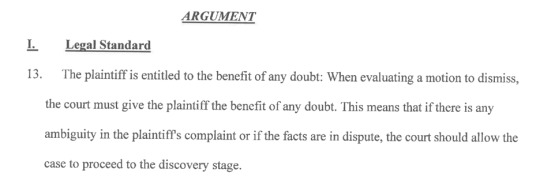
This is how the opposition begins its argument, and it’s…weird. The basic principle is...mostly correct here, but the actual standard is that when reviewing a motion to dismiss for failure to state a claim (which is what the defendant filed) the court must draw all reasonable factual inferences in the plaintiff’s favor. But even then, you don’t just put that standard in your opposition. You cite to a case that lays out the standard.
Because that’s how courts and the law work. The courts don’t operate just based on vibes. They follow statutory law (laws made by legislature) and case law (the decisions made by courts interpreting what those laws mean). You don't just submit a filing saying, "here's what the law is," without citing some authority to demonstrate that the law is what you say (or are arguing) it is.
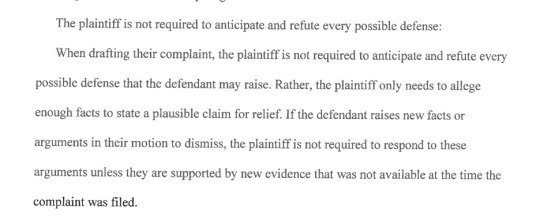
Again, this isn’t wrong (although I'm not sure what it means by new arguments?), but it’s weird! And part of the reason it’s weird is that it is irrelevant to the defendant’s motion to dismiss. The defendant filed a motion stating that based on the facts in the complaint, the plaintiff has not stated a claim based on which relief can be granted, because the complaint is time barred by a treaty. There is no reason for this language to be in the opposition. It’s almost like they just asked a chatbot what the legal standards are for a motion to dismiss for a failure to state a claim, and just copied the answer into their brief without bother to double-check it.
The opposition then cites a bunch of cases which it claims support its position. We will skip them for now, as the defendant will respond to those citations in its reply brief.
The last thing in the brief is the signature of the lawyer who submitted the brief affirming that everything in the brief is true and correct. An extremely normal - required, even! - thing to do. This will surely not cause any problems for him later.

The next relevant filing is the defendant’s reply brief. Again, the existence of a reply brief in response to an opposition is extremely normal. The contents of this brief are…less so.

Beg pardon?
Just to be clear, this is not normal. It is normal to argue that the plaintiff’s cases are not relevant, or they aren’t applicable to this case, or you disagree with the interpretations, or whatever. It is not normal for the cases to appear to not exist.
Some highlights from the brief:
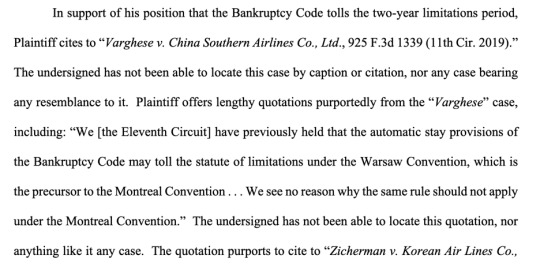

Quick lesson in how to read U.S. case citations! The italicized (or underlined) part at the beginning is the name of the case. If it is a trial court case, the plaintiff is listed first and the defendant second; if the case has been appealed, the person who lost at the lower court level (the petitioner/appellant) will be listed first, and the person who won at the lower level (the respondent/appellee) will be listed second. There are extremely specific rules about which words in these names are abbreviated, and how they are abbreviated. Next, you list the volume number and name of the reporter (the place where the case is published), again abbreviated according to very specific rules, then the page number that the case starts on. If you are citing a case for a specific quote or proposition, you then put a comma after the beginning page number, and list the page number(s) on which the quote or language you are relying on is located (this is called a “pincite”). Finally, you put in parenthesis the name of the court (if needed)(and again, abbreviated according to extremely specific rules) and the year the case was decided.
So the plaintiff’s response cited to Zicherman, which they said was a case from 2008 that was decided by the 11th Circuit Court of Appeals. However, the defendant was not able to find such a case. They were able to find a case with the same name (the same petitioner and respondent), but that case was decided by the U.S. Supreme Court in 1996, and the lower court cases associated with that case weren’t in the 11th circuit either. (The United States Reports is the only official reporter for the U.S. Supreme Court, and only includes SCOTUS decisions, so it’s not necessary to include the name of the court before the year it was decided.)
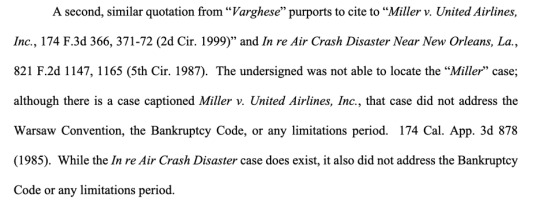
Just to be clear. The defendant’s brief is saying: the plaintiff cited and extensively quoted from these cases, and neither the cases nor the quotations appear to exist. These “cases” were not ancillary citations in the plaintiff’s brief. They were the authority it relied upon to make its arguments.
This is as close a lawyer can come, at this point in the proceedings, to saying, “opposing counsel made up a bunch of fake cases to lie to the court and pretend the law is something different than it is.”


That, “Putting aside that here is no page 598 in Kaiser Steel,” is delightfully petty lawyer speak for, “you are wrong on every possible thing there is to be wrong about.”
By page 5, the defendant has resorted to just listing all of the (apparently) made up cases in a footnote:


(skipping the citations to support this proposition)

This is where I return to my struggle to explain the opposition’s second reason why the motion to dismiss should not be granted. I struggled to explain the argument, because they failed to explain why the argument they were making (that plaintiffs can bring lawsuits against airlines in state court, and the state court have specific statutes of limitations for general negligence claims) was relevant to the question of whether the plaintiff’s specific claim against the airline was time barred by the treaty. Because 1) this case is in federal court, not state court, and 2) federal law - including treaties - preempts state law. Again, it’s almost like plaintiff’s attorney just typed a question about the time bar into a chatbot or something, and the machine, which wasn’t able to reason or actually analyze the issues, saw a question about the time to bring a lawsuit and just wrote up an answer about the statute of limitations.
We also end with a nice little lawyerly version of “you fucked up and we are going to destroy you.” The relief requested in the defendant’s original motion to dismiss was:

In their reply to the opposition, however:

“The circumstances” in this case, being the apparent fabrication of entire cases. Because courts tend to take that pretty seriously.
And the court took it seriously indeed. The defendant’s reply was docketed on March 15th of this year. On April 11th:

AKA: you have one week (an extremely prompt time frame for federal court) to prove to me that you didn’t just make up these cases.
On April 12th, the plaintiff’s attorney requests more time because he’s on vacation:

The judge grants the motion, but adds in another case that he forgot to include in his first order.
On April 25th, the plaintiff’s attorney files the following:

(And he lists the cases, with one exception, which he says is an unpublished decision.)
But he says of all of the cases except two, that the opinions…

Which is…nonsense?
First of all: if you cited a case, you had to get it from somewhere. Even unpublished opinions, if you are citing them in a brief, you are citing them because you pulled them off of westlaw or whatever. Which means you have access to the case and can annex it for the court. (There are even formal rules for how you cite unpublished opinions! And those rules include citing to where you pulled the damn case from!)
Secondly: remember that long digression I went into about how to read case citations? Remember that bit about how you include the name of the reporter (the place the case was published)? Yes, cases are published. They are printed in physical books, and they are published online in databases (e.g. lexis or westlaw). If the specific online database you are looking in does not have the case, you look somewhere else. If you have a judge telling you to get them a copy of the case Or Else, you track down a physical copy of the reporter if you need to and scan the damn thing yourself. You - literally - can’t just not have a copy of the case! (Especially published federal circuit court opinions, which multiple of these cases are! Those aren’t hard to find!)
And what kind of “online database” doesn’t include the entire opinion anyway? I’ve literally never heard of a case research database that only included partial opinions, because that wouldn’t be useful.
Maybe if we look at the attached annexed copies of the cases, that might give us some answers.
...
My friends, these things are just bizarre. With two exceptions, they aren’t submitted in any sort of conventional format. Even if you’ve never seen a legal opinion before, I think you can see the difference if you just glance through the filings. They are located at Docket entry #29 on Court Listener (April 25, 2023). Compare Attachments 6 and 8 (the real cases submitted in conventional format) to the other cases. Turning to the contents of the cases:
In the first one, the factual background is that a passenger sued an airline, then the airline filed a motion to dismiss (on grounds unrelated to the treaty's time bar), then the airline went into bankruptcy, then the airline won the motion to dismiss, then the passenger appealed. And the court is now considering that appeal. But then the opinion starts talking about how the passenger was in arbitration, and it seems to be treating the passenger like he is the one who filed for bankruptcy? It’s hallucinatory, even before you get to the legal arguments. The “Court of Appeals” is making a ruling overruling the district court’s dismissal based on the time bar, but according to the factual background, the case wasn’t dismissed based on the time bar, but on entirely other grounds? Was there some other proceeding where the claim was dismissed as time barred, and it’s just not mentioned in the factual background? How? Why? What is happening? Also it says Congress enacted the treaty? But, no? That’s…that’s not how treaties work? I mean, Congress did ratify the treaty? But they didn’t unilaterally make it!
In the second case, there’s an extended discussion of which treaty applies to the appellants claims, which is bizarre because there are two relevant treaties, and one replaced the other before the conduct at issue, so only the new treaty applies? There isn’t any discussion of the issue beyond that basic principle, so there is no reason there should be multiple paragraphs in the opinion explaining it over and over? Also, it keeps referring to the appellant as the plaintiff, for some reason? And it includes this absolutely hallucinatory sentence:

…the only part this that makes sense is that the argument is without merit. I’m not going to discuss the actual merits of the legal arguments in the opinion, because they are so bizarre and disjointed that even trying to describe them would require a Pepe Silvia-sized conspiracy board. Like the previous case, both the facts and the legal posture of the case change constantly, with seemingly no rhyme or reason.
The third one…oh boy. First, large portions of the “opinion” are individual paragraphs with quotations around the whole paragraph. What’s happening there? As far as the content of the opinion itself - I can’t. I mean that, I literally can’t. What is being discussed seems to change from paragraph to paragraph, much of it contradicting. It makes the first case seem linear and rational by comparison. The court finds it doesn’t have personal jurisdiction over the defendant so dismisses the case based on a lack of subject matter jurisdiction? But also the defendant hasn’t contested jurisdiction? And also the court does hold that it has both subject matter and personal jurisdiction over the defendant? And then it denies the motion to dismiss the case? Also, at one point it cites itself?
…also, even if this was a real case, it doesn’t stand for the propositions the plaintiff cited it for in their opposition? I’m not going to go into the weeds (honestly it’s so hallucinatory I’m not sure I could if I tried), but, for example, the plaintiff’s reply brief states that the court held “that the plaintiff was not required to bring their claim in federal court.” The U.S. District Court for the District of Columbia is a federal court, and there is no discussion of any filings in state courts. The closest the “opinion” comes is with the statement, “Therefore, Petersen’s argument that the state courts of Washington have concurrent jurisdiction is unavailing.” (This statement appears to be completely disconnected from anything before or after it, so I am unsure what it is supposed to mean.)
Moving on, case number four is allegedly a decision by the Court of Appeals of Texas. It includes the following line:

Honestly, the plaintiff’s attorney best defense at this point is that he wasn’t intentionally trying to mislead the court, because if he was doing this on purpose, he would have edited the cases to make them slightly more believable. (Context in case you’ve lost track: these documents are supposed to be copies of the opinions he is citing. The screenshoted line makes it clear that what he is actually citing is, at best, someone else’s summary of an "opinion". It would be like if a teacher asked a student to photocopy a chapter of a book and bring it into class, and instead the student brought in a copy of the cliffs notes summary of that chapter. Except that the book doesn’t even exist.)
The actual contents of the “opinion” are, as is now standard, absolutely bonkers. First, the court decides that it doesn’t have personal jurisdiction over Delta because “Delta did not purposefully avail itself of the benefits of conducting business in Texas.” This was despite the fact that the factual background already included that the appellant (sorry, the plaintiff, according to the “opinion”) flew on a Delta flight originating in Texas. Like, this is just wrong? It’s not even hallucinatory nonsense, it’s just facially incorrect legal analysis. Then the court starts discussing the treaty’s time bar, for some reason? Then it goes back to talking about personal jurisdiction, but now the trial court denied the defendant’s motion to dismiss for lack of personal jurisdiction, and the appellate court agrees with the trial court that it does have personal jurisdiction, even though this is the plaintiff’s appeal from the dismissal for lack of personal jurisdiction and the court already ruled it didn’t have personal jurisdiction? And even though on page 1, the plaintiff was injured during a flight from Texas to California, now on page 7 she was injured on a flight from Shanghai to Texas? Also the trial court has gone back in time (again) to grant the motion to dismiss that it previously denied?
Also, I’ve been trying to avoid pointing out the wonky text of these submissions, but:

Everything ok there?
Case number five is similar enough to number four that it’s not worth repeating myself.
Thank god, cases six and eight, as noted above, are real cases, so I’m going to skip them. The defendant alleges that the cases do not stand for the propositions the plaintiff cited them for, and I’m going to assume that is true, given the rest of this nonsense.
Case number seven looks legitimate on the surface. But neither the defendant nor I could find the case through any legitimate search mechanisms. The defendant looked up the purported docket numbers on PACER and found completely different cases; I was able to find a case with the name “Miller v. United Airlines, Inc.,” but it was for a different Ms. Miller, it was a California state case (not a Second Circuit federal case), it was decided on a different year, and the substance of the case was entirely different from the alleged opinion filed with the court.
On top of that, this might be the most morally reprehensible fake citation of them all? Because it is about the crash of United Airlines Flight 585, a real plane crash. Everyone on board - 25 people in total - was killed.
The individual cited in this fake court case was not one of them.
I cannot imagine conducting myself in such a way where I would have to explain to a judge that I made up a fake case exploiting a real tragedy because I couldn’t be bothered to do actual legal research.
Now, I know you all have figured out what’s going on by now. And I want you to know that if your instincts are saying, “it seems like the lawyer should have just fallen on his sword and confessed that he relied on ChatGPT to write his original brief, rather than digging himself further into this hole”? Your instincts are absolutely correct.
Because obviously, the court was having none of this b.s. On May 4th, the court issued an order, beginning with the following sentence:

That is one of the worst possible opening sentences you can see in an order by the court in a situation like this. The only thing worse is when judges start quoting classic literature. If I was Mr. Peter LoDuca, counsel for the plaintiff, I would already be shitting my pants.
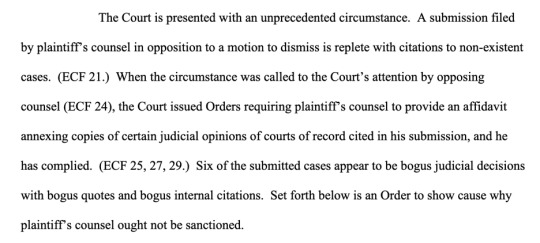
“I gave you an opportunity to either clear things up or come clean. Now I’m going to give you an opportunity to show why I should only come down on you like a pile of brinks, instead of a whole building.”

We are getting dangerously close to “quoting classic lit” territory here.
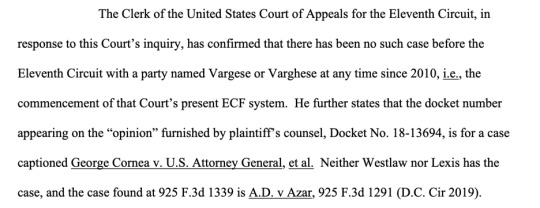
If I learned that the judge in my case called up the clerk of a circuit court just to confirm how full of shit I was, I would leave the legal profession forever. Also, the judge is now also putting quotes around “opinion.” When judges start getting openly sarcastic in their briefs, that means very very bad things are about to happen to someone.

So I’m guessing the delay between this filing and the court order was because the judge’s clerk was tasked with running down every single one of the additional fake citations included in the "opinions", just to make this sure this order (and the upcoming pile of bricks) are as thorough as possible.
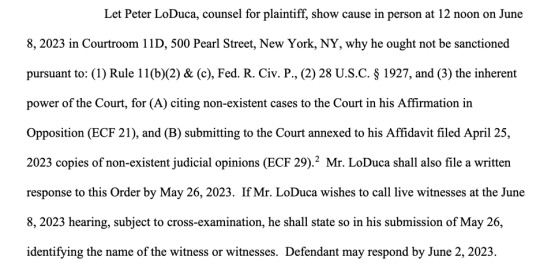
If you are following along with Dracula Daily, the vibe here is roughly the same as the May 19th entry where Dracula demands Jonathan Harker write and pre-date letters stating he has left the castle and is on the way home.
Also, hey, what’s that footnote?

Wait, what?
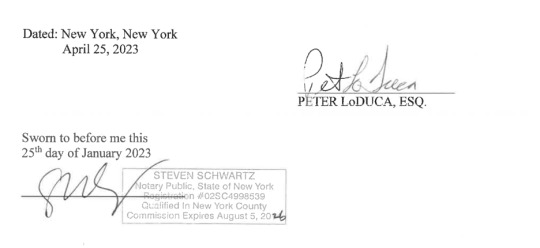
Folks, it appears we may have notary fraud, on top of everything else! Anybody have bingo?
So on May 25, one day before the deadline, Mr. LoDuca filed his response. And oh boy, I hope ya’ll are ready for this.
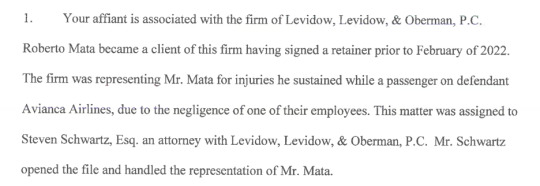
Hey, what’s the name of that other attorney, “Steven Schwartz”? Where have I seen that name before…
...I ran out of room for images on this post. So I'm going to have to leave this as an accidental cliffhanger. Part 2 to follow once I refresh my tea.
9K notes
·
View notes
Text
ace attorney lawyer specialties if they werent in criminal law
phoenix - tort personal injury, plaintiff leaning
edgeworth - law of obligations. civil law
mia - also tort personal injury prolly, maybe family law
apollo - boutique family law or labour law
athena - IP since she has the science bg
kristoph - tort negligence / personal injury, large corp defense. mergers and acquisitions. real estate. tax. something lip curling. def an in house for a big corp whatever it is
klavier - international business ? maybe ? or IP? open to suggestions here idk — edit: IP law / entertainment law was such an easy grab idk why i didnt think of it before
Godot - tax law
franziska - definitely interntional business
sebastian - law student. doesnt really know what he wants to do rn
blackquill - tax law
481 notes
·
View notes
Text
#Medical Records Reform#Medical Chronology#Chronological Medical Records#Narrative Summary#Medical Narrative Summary#Demand Letter#Expert Medical Opinion#Medical Expert Opinion#Deposition Summary#Medical Billing Summary#Medical Expenses#Billing Summary#Med-Interpret#Med-A-Word#PDF Merging#PDF Sorting#Provider List#Jury Questionnaires#Bookmarks#Free Bookmarks#Hyperlinks#Free Hyperlinks#Identify Missing Records#HIPAA Compliance#HITECH Compliance#Medical Malpractice#Personal Injury#Mass Tort#Worker’s Compensation#Nursing Home Abuse
0 notes
Text
I twitch every time someone mentions the "hot coffee" lawsuit to me as an example of frivilous lawsuits because Stella Liebeck deserves better. I had this out with an actual PI paintiffs' attorney one time, this suit is one of only a handful from my 1L torts class that genuinely activated my sense of justice.
Buckle in, because I need y'all to know Stella's story.
To clear up a common misconception, Liebeck was not driving when her coffee spilled. She was in the passenger seat of a parked car that lacked cup holders, so she was holding the drink in her lap while she added cream and sugar. The spill (and subsequent burns) came from her attempting to lift the lid of the coffee to do this. The coffee that hit her lap was a minimum of 180 degrees Fahrenheit. For Celsius folks who don't know the conversion, water boils at 212 degrees Fahrenheit. Her cotton pants absorbed the hot coffee, leaving it against her skin instead of it running off.
Stella went into shock and suffered third-degree burns on 6% of her skin. She needed skin grafts, and remained partially disabled from her injuries for two years. She incurred $10,500 in medical expenses by the time she began pre-litigation negotiations with McDonald's, and expected to incur $2,500 more. Her daughter, who left her work to care for her for three weeks during her recovery, lost $5,000 in wages. Liebeck asked McDonald's for $20,000 to cover the expenses - McDonald's offered eight hundred dollars and would not budge.
After Liebeck filed suit, McDonald's rejected settlement offers for $90,000; $300,000; and $225,000.
At trial, Liebeck's attorneys raised that most other establishments in that area served coffee nearly 40 degrees Fahrenheit cooler - at just 140 degrees Fahrenheit. Every establishment they had tested had served their coffee at least 20 degrees Fahrenheit cooler. They also produced evidence that coffee at 190 degrees Fahrenheit can produce third-degree burns in just three seconds. At 180 degrees Fahrenheit, that time is still only about twelve seconds. But, at the lower temperature of 160 degrees Fahrenheit, a burn victim has twenty seconds to remove the coffee before suffering third-degree burns.
McDonald's claimed the high temperature was so that commuters could drive to their destination before consuming their (now-cooled) coffee; however, McDonald's own consumer research demonstrated that the majority of customers consumed their coffee in their car, on the way to their destination. Prior to Stella's injuries, McDonald's had received more than 700 burn reports in a ten-year period, of varying severity. McDonald's had also previously settled such claims for more than $500,000, depending on the severity of the burns. Their own quality control manager acknowledged that the coffee could scald a customer's mouth and throat (burns in the mouth and throat have the potential to be extremely severe and potentially fatal emergencies).
Liebeck's jury - consisting of, you know, regular people who were just given the evidence - determined that McDonald's bore 80% of the fault for Liebeck's injuries. Though the coffee cup bore a warning that the contents were hot, the jury decided specifically that the warning was neither large enough nor sufficient to warn Liebeck of the potential danger.
The jury found that Liebeck had suffered $200,000 of damages, which was reduced to $160,000 to account for Stella's own negligence (the jury found her 20% responsible for the incident).
The jury also wanted to award punitive damages of 2.7 million US Dollars (the equivalent of two full days of McDonald's coffee sales). The judge reduced the damages to just $480,000, or three times the amount of Stella's damages.
The lawsuit that McDonald's refused to settle for $20,000 ultimately cost the company $640,000, not because Liebeck was being dramatic or greedy, but because McDonald's chose to offer an honestly insulting $800 to a woman who had been permanently disfigured by near-boiling coffee.
McDonald's, since then, has enlarged the warning on its cups and has also upgraded the cups themselves to reduce the risk of spills. Though the lawsuit did not revolve around McDonald's packaging methods, it is now the recommendation of Specialty Coffee Association of America to use improved packaging and more visible warnings to prevent spills and subsequent injury.
McDonald's still doesn't really care about consumer safety, though. In 2019, autistic four-year-old Olivia Caraballo suffered second-degree burns when a Chicken McNugget from her Happy Meal fell on her leg and got caught between her thigh and her seatbelt. In May of 2023, a jury found both the franchise owner (Upchurch Foods) and McDonald's USA itself liable for Olivia's injuries, because the franchise owner failed to warn for hot foods and negligently cooked the food at higher temperatures than necessary, and because McDonald's USA failed to provide proper safe handling instructions for the food. In July, the jury that awarded damages granted Olivia's family $800,000 in damages (McDonald's had claimed her damages were no more than $156,000).
McDonald's is not, has never been, and will never be the victim in these lawsuits. Their deliberate strategy is to discourage these lawsuits by painting them as frivolous, and when you take the company's side, you are helping them escape liability for injuries that they caused, and continue to cause, all because it's cheaper to handle a potential lawsuit than it is to fix the problem
See also: Grimshaw v. Ford Motor Co., a 1981 lawsuit where Ford Motor Co. determined it wasn't worth remedying design defects in the Ford Pinto despite the Pinto's tendency to explode during certain types of crashes.
The thing I wish I knew when I was younger
If you ever see a court case that sounds bonkers, look past the headlines. If a company is sued by someone they might be trying to make the person (rightfully) suing them look crazy or frivolous.
Look past the headline and you might not be thinking "well coffee is usually hot" you instead think "oh my god I can't believe a company served their coffee so hot that it mutilated someone and burned their legs, melting them together a bit, that's crazy"
You might see someone suing a theme park over a water slide, think that's real weird, until you look past the headline and see the person suing lost some intestine on the ride.
Look PAST THE HEADLINE. Companies will purposefully make the person suing look crazy, frivolous, or like a Karen. Companies DO NOT CARE ABOUT YOU. The second you speak up, you WILL be made a laughingstock.
16 notes
·
View notes
Text
#Medical Records Reform#Medical Chronology#Chronological Medical Records#Narrative Summary#Medical Narrative Summary#Demand Letter#Expert Medical Opinion#Medical Expert Opinion#Deposition Summary#Medical Billing Summary#Medical Expenses#Billing Summary#Med-Interpret#Med-A-Word#PDF Merging#PDF Sorting#Provider List#Jury Questionnaires#Bookmarks#Free Bookmarks#Hyperlinks#Free Hyperlinks#Identify Missing Records#HIPAA Compliance#HITECH Compliance#Medical Malpractice#Personal Injury#Mass Tort#Worker’s Compensation#Nursing Home Abuse
0 notes
Text
Lucanis’s Head Cannons:
- This man loves the opera ( Not so much musicals, but the proper opera. Will try to take you to a show entirely in Antivan – forgetting you don’t speak a word of in and has to translate the entire thing for you. It ends up being a very cute date, as a whisper tibits bout characters and the plot to you quietly throughout the show)
- This man thinks flavored coffee is the devils work ( don’t look at me, I LOVE my Carmel macchiato flavored coffee as much as the next person – but this man is a purist who would gag at the idea of his lovely beans being covered with a fake ass flavoring to make them palatable)
- Can sew quite well ( you can’t convince me this man hasn’t tended to enough of his own injuries that he’s become very well versed with a needles and thread. Maybe he’ll even make something for Rook. The stitched would be perfectly spaced and stick straight but the fitting of any garment would probably be a mess. He should probably just stick to skin)
- He wears cheaters to read (obviously his far sight has to be 20/20 but there’s something I just love about the idea of him curled up with a cup of coffee, a pair of readers, and trashy romance novel.)
- Boxed wine is an affront to all wine ( I have a feeling if Rook brought this home, mostly to get a rise out of him, he would refuse to try it. Poor little rich boy, only drinking from crystal glasses and premium vintages. While Rook drinks box wine out of a coffee cup and thinks it’s heavenly)
- His love of reading came from not being able to sleep ( He liked to read before the Ossuary, but once Spite came into the picture he started reading more as a means to keep his mind busy, and to have something to focus on late at night when everyone else is already asleep. It definitely does not help with all his pinning after Rook – but he does get a few good ideas.)
- The tort idea absolutely came from one of his romance novels ( He absolutely read about it in a hurt/comfort romance about a jaded baker who doesn’t believe in love and the sunshine regular who adores his cooking)
- Asking Emmerich for the tort recipe was one of his top ten most embarrassing moments, especially when Emmerich mentions just how much Rook loves hazelnut ( right behind crying during his first day of training as a crow, giving that knife to Viago but to be fore scorned and the time the first talon caught him and Illario playing make believe wyverns as children when they were supposed to be studying)
- He taught Spite how to speak Antivan while in the Ossuary ( he had nothing better to do, and it kept his mind busy and present during some of Zara more difficult experiences)
- Lucanis loves and hates Mage!Rook being able to hear Spite. It helps that he’s not the only one who can hear the demon, but it’s awkward when creature forgets about decorum and saying something a little too honest or blunt. Especially if they’re trying to be romantic
- As much as he wants cooking with you to be a romantic experience, he can’t stand having another person in the kitchen when he’s cooking. There’s too many moving parts, and Rook always seems to be right where to he needs to be when a time goes off, or something needs to be done.
- This man has a sweet tooth, he used to sneak into the kitchens to learn how to cook (eat churros) you can’t convince me that he doesn’t have a secret stash of chocolate that he’ll break into for Rook after a hard fight or just a bad day.
- Loves to dance. This is non-negotiable, there is no way this man can’t dance. There’s no way Caterina raises this man and didn’t teach him every appropriate step in both ballroom dancing and modern dancing like salsa and tango. I’d be after coffee, and wine – his favorite date to take you on is dancing. ( brownie points to using Spite’s wings to do an impressively ridiculous lift too)
#lucanis dellamorte#lucanis x rook#dragon age lucanis#head canon#datv#datv lucanis#datv lucanis head canon#lucanis romance#da4 lucanis#lucanis headcanons
67 notes
·
View notes
Text
it sucks cuz i don't WANT to go into torts/personal injury 1) on principle because that's what my dad does and 2) i know how fucking intense and traumatizing PI cases can be and i truly don't have the emotional resilience to hear those stories day in and day out
but. i'm. really good at torts/personal injury...
#like. growing up with my dad has made it very intuitive for me.#i just drafted a full four-cause complaint from scratch in like. 40 minutes?#and submitted it without even thinking twice.#by far the easiest full-point assignment i've had in all the classes i've taken so far.#izzy.txt
7 notes
·
View notes
Note
Why do people like that Annie freak think Maya's father works for the drug cartels?
Because Annie is deeply stupid and knows nothing about the legal profession.
Maya's father is a personal injury lawyer. A personal injury lawyer is a lawyer who provides legal services to those who claim to have been injured, physically or psychologically, as a result of the negligence of another person, company, government agency or any entity. Personal injury lawyers primarily practice in the area of law known as tort law.
https://en.wikipedia.org › wiki › P...
The drug cartels hire lawyers who specialise in criminal defence not personal injury. Why would a dealer or drugs boss need to claim for personal injury? They need a lawyer who can negotiate a reduced prison sentence or similar.

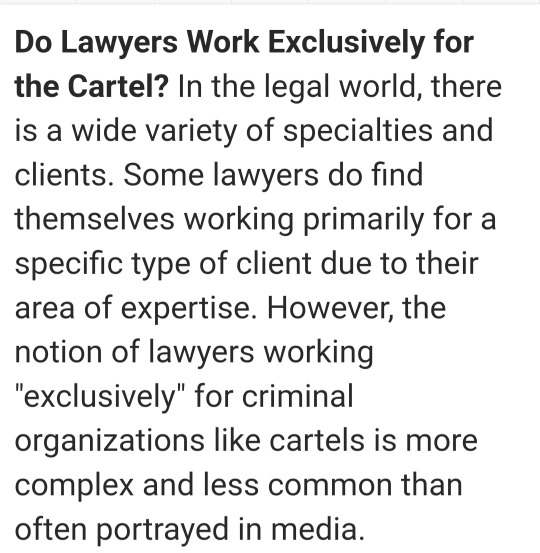
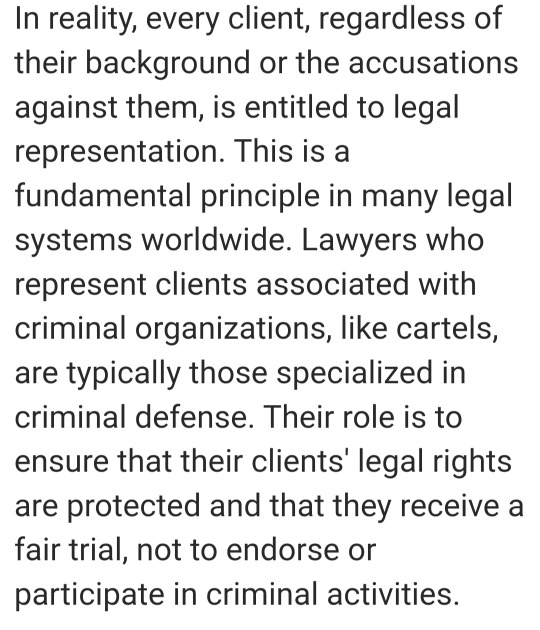

#thomas j henry#thomas henry#does maya's father work for the cartels#maya henry#liam payne#conspiracy theorists#zayn#ziam#ziams
9 notes
·
View notes